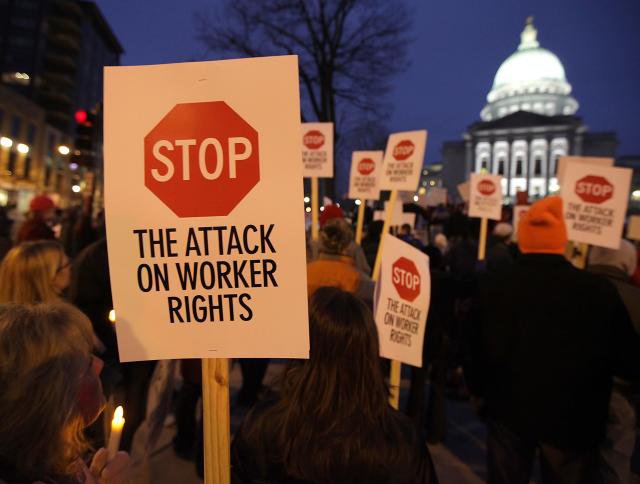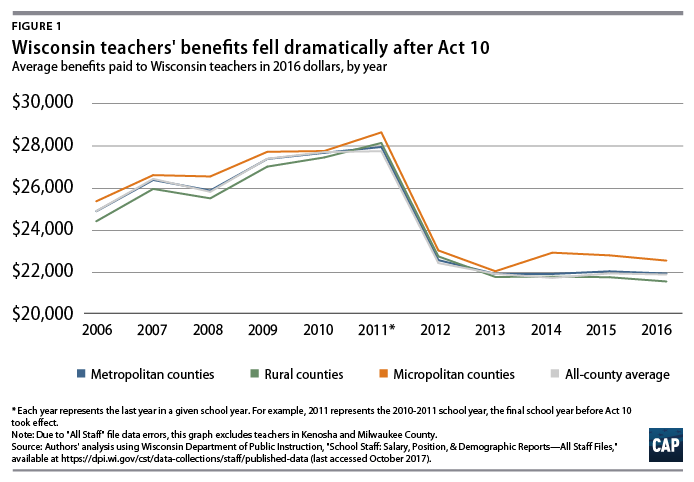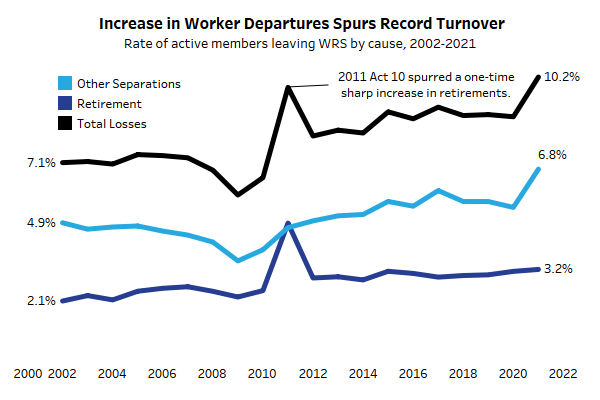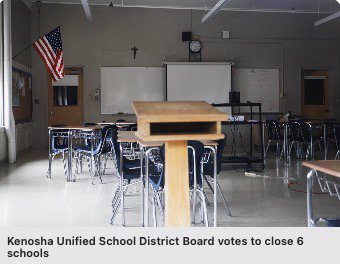Today the right-wing law firm, Wisconsin Institute for Law and Liberty (WILL) announced they were suing to keep Act 10 in place on behalf of KUSD High School teacher Kristi Koschkee of Pleasant Prairie WI. Koschkee appeared in ads for Scott Walker as well as anti-teacher union ads in the past.

Act 10, the Bomb that Hit Wisconsin
Act 10, which then-Republican Gov. Scott Walker called 'the bomb' ended the ability of targeted public sector unions to have the power for workers to join together to bargain over working conditions, benefits and pay. Act 10 was met with widespread peaceful protests at the Madison Capitol that lasted over 17 days and which were chronicled in the film 'Divided We Fail.'
“Act 10 continues to have clear repercussions in not only the state’s politics, which is pretty obvious, but even in the way that people relate to each other and the difficulty of beginning to resolve our problems, including something as straightforward as taking precautions during the pandemic,” said University of Wisconsin-Madison journalism professor Lewis Friedland, a member of a research group studying communication, political attitudes and behaviors in the state. Friedland agreed, Act 10 amounted to “an explosion set off in Wisconsin civil society. “I think there’s a straight line from Act 10 to the politics that we’re experiencing today.”
Act 10 resulted in targeted public workers, including teachers, losing their ability to bargain collectively.
Anti-union teachers like Kristi Koschkee of KUSD, who is suing to keep Act 10 in place, receive all the benefits of negotiated pay raises and benefits without financially supporting the union who work on behalf of teachers to secure those financial benefits.
"Act 10 is pro-freedom-to-freeload ... and provides people like Kristi the ability to have all the benefits from collective bargaining without any of the cost..." said Wisconsin journalist John Norcross.

Peaceful protest at Madison Capitol during Act 10
Act 10 Politically Targeted Unions That Did Not Endorse Scott Walker, But Exempted Those Which Did
Walker exempted certain unions from Act 10, those that publicly supported his first election.
A separate lawsuit from Koschkee's, this one seeking to overturn Act 10, was filed in November of last year. That lawsuit is challenging the constitutionality of Act 10 since some unions received favored treatment from Walker.
In an opposite position from Kristi Koschkee's, teachers who brought that lawsuit said Wisconsin teachers would benefit from overturning Act 10.
“The end of Act 10 would mean that we would have a real say again in our retirement plans, health care and time off — without the threat of loss of our union every year,” Wayne Rasmussen, who works for the Racine Unified School District, said in a statement. Rasmussen is one of three individuals named in the lawsuit along with the unions. He is vice president of the Service Employees International Union of Wisconsin, which represents health care workers and others.

Studies Show Negative Impact of Act 10 on Student Test Scores, Teachers and Schools
Numerous studies over the years have shown the impacts of Act 10 on students and teachers. Those impacts include:
* a substantial decline in student test scores, particularly in math and science;
* shrinking of Wisconsin public sector workers, including the number of teachers in the work force; teacher exit rates remain high in Wisconsin, with 12.4% exiting the field in 2023, resulting in staff shortages and a lack of substitute teachers;
* Wisconsin has a higher number of teachers with less than 5 years of experience following the passage of Act 10;
* reduction in public employees’ pay as employees took on a bigger share of pension and health care costs;
* upon passage, the average Wisconsin public employee, who was making around $50,000 a year at the time, the passage of Act 10 meant a decrease of around 8.5%, or $4,228 to their take-home pay;
* public workers lost the ability to join together to bargain over health care and benefits, unless their employer is willing to listen; in the aftermath of Act 10, the average benefits paid to Wisconsin teachers dropped by nearly 19 percent from the 2010-11 school year to the 2011-12 school year. The average amount of benefits paid per Wisconsin teacher has continued to drop in real, inflation-adjusted terms;
*public workers lost the ability to join together to bargain over workplace issues like safety, overtime and scheduling, unless their employer is willing to listen;
* raises for public workers are limited to the rate of inflation; KUSD teachers received half the rate of inflation in their latest contract;
* money saved by Act 10 mostly went to tax cuts for the wealthiest in Wisconsin with the top 1 percent of state residents receiving a larger share of the cuts than the bottom 60 percent of households combined;
* decimated morale of public sectors workers in Wisconsin;
* Poorer districts and those with a high number of students of color have been particularly impacted;
* job growth in Wisconsin and the number of public sector workers lags well behind Wisconsin's neighbors.


KUSD Struggling to Attract and Retain Teachers; Closing 6 Schools
School districts across the state, including in Kenosha, have seen declining teacher experience, a shortage of quality teachers and substitute teachers, and increasing turnover, which studies have shown can harm students and their academic performance. Kenosha has experienced lower student outcomes, experienced teachers have retired, and the district has struggled to attract and retain qualified teachers to fill classrooms. KUSD teachers received pay raises that didn't meet the cost of living this year and which were lower than other school districts. KUSD has struggled with a multi-million budget deficit which resulted in a board decision to close 6 KUSD schools in December. It's a decision which has devastated the community and raised outrage about the fact the closings targeted fell hardest on schools that serve minority and poor students.
"It's going to be a big change, and I'm sad for the families who are low-income and do not have transportation or the ability to get their kids to and from school," KUSD parent Danielle Palmer said.
KUSD is the only large school district in Wisconsin which hasn't held a referendum to allow voters to choose whether they want to invest more money in their local schools. Community groups and individuals have called for the district to hold a referendum in 2024.

Kristi Koschkee of Pleasant Prairie Has Sued Before For Right-Wing Causes
In addition to suing to defend Act 10, Kenosha teacher Kristi Koschkee, of Pleasant Prairie WI, is no stranger to the right-wing Wisconsin Institute for Law and Liberty (WILL).
Koschkee was a plaintiff when WILL sued the state and won in the controversial case, Koschkee v Taylor the decision of which resulted in widespread accusations of corruption against Supreme Court Justice Dan Kelly.
The ruling made successful an eight-year effort by Republicans to diminish the power of the state schools superintendent, who oversees the Department of Public Instruction.
The case became controversial when it became public that board members of WILL handed Wisconsin Supreme Court Justice Dan Kelly $2000 in donations just before Kelly ruled in favor of Koschkee's lawsuit, handled by WILL.
Kristi Koschkee, a KUSD Public School Teacher, Supports Other Right-Wing Causes That Hurt Public Schools
Koschkee joined members of Kenosha Moms for Liberty, including its leader Amber Infusino and her husband, in sign onto the controversial "Parent Bill of Rights" in Feb. 2022 in Wisconsin.
The bill would have given politicians control of the Milwaukee Public School System, increased the number of religious and private for-profit schools receiving Wisconsin taxpayer- funded vouchers, and given Wisconsin's wealthiest families vouchers at tax payer expense.
When Gov. Evers vetoed the bill, he said “It is remarkable to me that many supporters of this bill, who commonly express concerns about property taxes when it comes to supporting more than 800,000 public school children in our state, are apparently unfazed by the fiscal impact this bill could have on families due to the way these programs are funded,” Evers said in his veto message.
“Wisconsin is currently supporting four separate private voucher systems, none of which give taxpayers a say in how their money is spent,” teacher Peggy Wirtz-Olsen, president of the Wisconsin Education Association Council said. “Voucher lobbyists continue to demand more funding, leading to the historic increase for private schools in the 2023-25 state budget. It’s time for this to stop. Wisconsin should invest in public schools that are open to all students.”
Sources for information on the impact of Act 10:
Gutting Wisconsin teachers unions hurt students, study finds
'Act 10 took away our voice': One decade in, public employees still see law’s effects
Attacks on Public-Sector Unions Harm States: How Act 10 Has Affected Education in Wisconsin
Report shows Wisconsin is facing a teacher turnover crisis
Productivity Returns to Experience in the Teacher Labor Market
The Effect of Teachers' Unions on Student Achievement: Evidence from Wisconsin's Act 10
